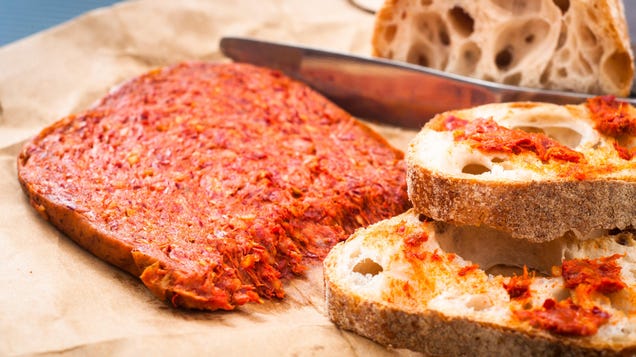
The idea of spreadable sausage might sound a bit odd when you first learn about it. My concept of sausage had always been ground-up meat in encased link form, full stop. The first time I encountered the spreadable kind, I was in line at Tempesta Market here in Chicago (incredible sandwiches, by the way), awaiting my deli order.
A portion of ’nduja was sitting on the counter for customers to sample as they were browsing the store. After I watched someone else sample it, I reached in, spread it on a piece of bread, took a bite, and was immediately smitten. I’m here to share the joy of this incredible spreadable meat.
What is ’nduja?
’Nduja (yes, spelled with the apostrophe and pronounced “endooya”) really is a spreadable sausage: It comes in encased form just like any other sausage does. But its interior texture is very soft, so instead of eating slices of sausage as you typically would, all you need to do is slice open the ’nudja and scoop out its innards with a butter knife.
The fermented meat spread hails from a city named Spilinga in the Calabria region of Italy. It’s made from pork and plenty of fat, and doesn’t need to be cooked before eating. Its signature red color comes from Calabrian chiles, an ingredient that makes the sausage piquant but not overwhelmingly spicy. It’s tangy, almost with a mineral note, and its rich flavor means it pairs well with starches.
How do you use ’nduja?
First of all, you can and should eat ’nduja straight up. Try it with a slice of crusty bread; since it’s so flavorful on its own, it doesn’t need any additional dressing up.
G/O Media may get a commission

24% Off
Evolur Zoodle 2-In-1 High Chair
Eat up
This 2-in-1 high chair can not only work as a high chair at a table, but also turned into a toddler chair as they get older, and has an adjustable feeding tray and it’s easy to clean.
Because of its high fat content, it’s also amazing as an ingredient in other dishes. You can toss chunks of it into pasta to add a funky layer of flavor to the dish without adding a ton of meat. Alternatively, you can add ’nduja to your tomato sauce as you cook it, causing the sausage to virtually melt into the mixture. In both cases, a little ’nduja goes a long way.
It does really well on pizza, too. As it cooks down, the fat from the ’nduja will mingle with the rest of the ingredients on top of your pie and create its own natural porky chile oil.
Try adding a touch of this meat to scrambled eggs or omelets for an indulgent breakfast. You can even incorporate it into a vinaigrette. Once you get to know its flavor profile, you’ll find out just how versatile it is, and why it’s worth stocking in your kitchen.
Can you make your own ’nduja?
Despite what a ton of YouTube tutorial videos might tell you, ’nduja isn’t quite something you can replicate on your own, unless you have a climate-controlled chamber in your home kitchen. You’ll most likely find it in grocery stores like Whole Foods or smaller specialty shops, and you can also order it online. But Serious Eats recently published a remarkable recipe for imitation ’nduja based off salami, and it’s one you can easily make at home, using a food processor. (Seriously. Mind blown.)
When it comes to home cooking, all I really want is to use a small handful of ingredients to create an impressive amount of flavor—without, you know, going to too much trouble to achieve it. ’Nduja is one of those little tricks you can keep up your sleeve in order to pack a ton of flavor into something without having to do any work at all.

